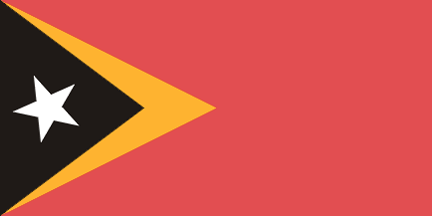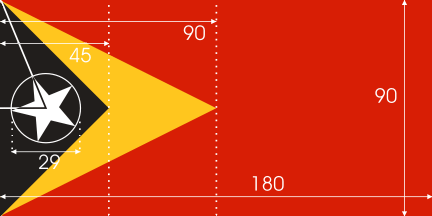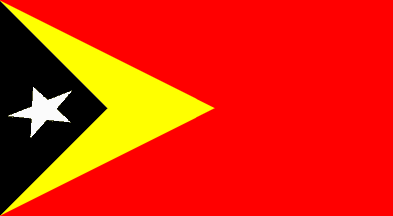 zachary harden
zachary harden
Keywords: star: 5 points (white) | arrowhead | triangle (black): hoist | untaet | doubt |
Links: FOTW homepage | search | disclaimer and copyright | write us | mirrors

Last modified: 2023-12-09 by  zachary harden
zachary harden
Keywords: star: 5 points (white) | arrowhead | triangle (black): hoist | untaet | doubt |
Links: FOTW homepage |
search |
disclaimer and copyright |
write us |
mirrors
 image by Manuel Gabino, 05 May 2002
image by Manuel Gabino, 05 May 2002
I confirm that the star is a regular pentagram and that the Constitution of the Democratic Republic of East Timor States in Section 15 (National Flag) states that The National Flag is rectangular and is formed by two isosceles triangles, the bases of which are overlapping. One triangle is black and the height is equal to one third of the length overlapped to the yellow triangle, whose height is equal to half the length of the Flag. In the center of the black triangle there is a white star of five ends, meaning the light that guides. The white star has one of its ends turned towards the upper right end of the flag. The remaining part of the flag is red. The colours mean: yellow the traces of colonialism; black the obscurationism that needs to be overcome; red the struggle for national liberation; and white peace.
Andrew Leith (Independence Day Celebrations Committee, UNTAET), 13 May 2002Technical Notes on the National Flag of East Timor.
- The Flag is 2 : 1 ratio (180 cm × 90 cm).
- The width of the star from point to point is 29 cm.
- The correct way up is such that one point of the star faces the top left hand corner.
- The Pantone Matching System (PMS) Colours are yellow PMS 123 and red PMS 485.
 image by Manuel Gabino, 28 September 2002
image by Manuel Gabino, 28 September 2002
These darker color shades are not prescribed
in the constitution,
only in the UNTAET specifications. (As also the
1:2 ratio.)
António Martins, 25 September 2002
The Democratic Republic of Timor-Leste has been admitted in the UN. The flag
shown in this
photo is 2:3 as all those hoisted outside the UN
building. And the colors seem not to be those appointed in the
document sent on May of this year.
Manuel Gabino, 27 September 2002

As at midnight on 19 May 2002 East Timor (Timor-Leste) becomes Independent. Attached for your Association and widest promulgation are the technical details of the East Timorese Flag which has been approved by the East Timor Public Administration:
Note: The contribution above (Andrew Leith, 04 May 2002) was sent by means of a MS Word document file containing the quoted text plus a picture (mirrored here as raster and vector files); all in this raster screen capture.
Image is based on incorrect costruction sheet: the black
triangle should reach 1/3 of the flag length (not 1/4).
Jan Zrzavy, 23 May 2002
The Timorese Constitution already approved states:
1. The National Flag is rectangular and is formed by two isosceles triangles, the bases of which are overlapping. One triangle is black and its height is equal to one-third of the length overlapped to the yellow triangle, whose height is equal to half the length of the Flag. In the centre of the black triangle there is a white star of five ends, meaning the light that guides. The white star has one of its ends turned towards the upper right end of the flag. The remaining part of the flag is red.While in the Andrew Leith’s files
As for comments on these “technical” specifications (some people
call technical anything including numbers and dashed lines…) and
adding to Manuel Gambino’s comments, I must say that I am shocked by
the prespective that these documents from UN official Andrew Leigh
might be representative of the Misson’s notion of accuracy and
technical competence.
Not only the annex figures contradict the (meagre) verbal
specifications of the document (namely in what ratio and color shades
are concerned), but also those specifications (both verbal and graphic)
are incomplete and unclear.
Finnaly, these specifications (both verbal and graphic) desagree with
the practice of 27 years of flag usage, namely
in the prescriptions about color shades, ratio (1:2 instead of 2:3) and
width of the black triangle (1/4 instead of 1/3).
António Martins, 05 May 2002
Please note that there is a error in my orginal email concerning
the National Flag for East Timor. Please disregard my first email.
Andrew Leith (Independence Day Celebrations Committee, UNTAET),
13 May 2002
Anything below this line was not added by the editor of this page.